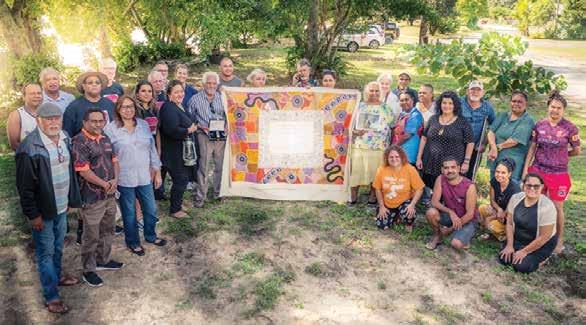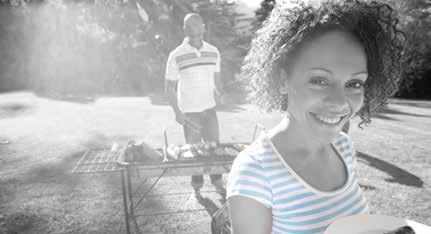
4 minute read
Voice sovereignty issues raised at Press Club
Late last week the Referendum Engagement Group met with the Minister for Indigenous Australians, the Attorney General, the Special Envoy for Reconciliation and the Implementation of the Uluru Statement from the Heart, and the Assistant Minister for Indigenous Australians for the third time.
In opening the meeting, Minister Burney noted momentum was building and significant progress had been made towards a referendum on a constitutionally enshrined Voice to Parliament, to be held later this year.
The Group agreed to meet again in March to continue to discuss ways to engage the community, including First Nations communities, on the referendum for an Aboriginal and Torres Strait Islander Voice to Parliament.
MEANWHILE Prime Minister Anthony Albanese fielded questions about sovereignty and the Voice at the National Press Club
There’s been a lot of debate about the order of doing things and whether there should be a Treaty first, or other actions on sovereignty, before we act on a Voice, host David Epstein said to the PM.
“Where does the Voice leave sovereignty,” he said.
Mr Albanese gave the following response:
“I make two points on that,” he said.
“One, and it is backed up by Justice French in the position that he puts eloquently [last] weekend, but also something that was very much confirmed by the Constitutional group that we have advising the Referendum Working Group.
“That includes people such as Justice Hayne, a former High Court Justice, it include Anne Twomey, it includes a range of constitutional experts.
“
…The vote and referendum will have no impact on the issue of sovereignty.
“No impact.
“It is very, very clear.
“And hence, I think there are a range of issues that have been raised and answered, that
I think is answered really clearly and eloquently …
“The other thing is about processes.
“The Uluru Statement from the Heart made it very clear, it speaks about Voice, Truth, Treaty.

“It made it very clear that their request from Aboriginal and Torres Strait Islander people was not unanimous.
“So why should we think that any group would have exactly the same views?
“There are a few hundred people in this room, I’m sure that there are different views about a whole range of things.
“And it seems to me, though, that what occurred at Uluru was literally thousands of conversations that since then have continued.
“And, overwhelmingly, the people who issued the statement at Uluru made it very clear that that a Voice enshrined in the Constitution was the first process that they wanted and it’s important to respect that.
“That is what the government is doing.
“And that’s why we think this is such an important step.
“Recognition in the Constitution has been spoken about since 1967, but particularly since early 1990s and we’ve never quite got there.
“And that’s why for those who say, ‘it is a risk having a referendum, because referendums in Australia, for our UK friends, are pretty hard.
“And they have not been successful, there hasn’t been a successful referendum in this country for half a century.
“But the risk of not proceeding with a vote is clear; it’s a 100 per cent guarantee of not having success, of failure.
“And I’ve said before, it’s like saying you’re worried about losing a grand final so we’ll just not run on the field and forfeit.
“For those people who have campaigned – if you trace this back: 2012 the process kicked off for constitutional recognition, five years consultation to 2017 Uluru Statement from the Heart, the parliamentary inquiry co-chaired by Pat Dodson and Julian Leeser, the Calma-
Langton report went to the former Cabinet twice – we’re in 2023.
“I always say: if not now, when?
“How long is it before we say that we’re going to put it to the Australian people, which is why we are determined to do just that.”
Mr Albanese also said the concept of the Voice had been developed over many years, and not by him or his government.
“This is something that has come from the bottom up, from the people,” he said.
“And we’re going to give the people the vote.
“And I am heartened by churches and faith groups I’ve met with across the spectrum, FECCA, the ethnic communities, sporting organisations, Cricket Australia, Tennis Australia, the NRL, the AFL, basketball, netball, all out there saying yes, and that they want to campaign for for a yes vote.
“Business organisations: the BCA, Australian Industry Group, Australian Chamber of Commerce and Industry, Minerals Council of Australia, individual corporations – I met with some of the resources companies in Perth last Wednesday – all out there campaigning.
“The trade union movement, both the peak, but individual unions and workplaces talking about this as well.
“Individual businesses are there talking to their workforce about why this will be a moment of respect for Aboriginal and Torres Strait Islander people, for nonIndigenous Australians a chance for us to all be a part of a moment that embraces the fullness and richness of our history, and for the world to look at Australia as a more mature nation, committed to reconciliation.
“…We’re part of the process as part of our democracy, but at the end of the day it’s going to be a decision for Australians.
“And I’m heartened by the local campaigning that’s not driven by any political party or any particular ideology, it’s driven by people out there who who want this to happen, knocking on doors and making phone calls and getting out there in a really positive way.
“And that’s why I say it can be the moment of national unity, this vote going forward.”
For more information about the Voice see: https://voice.niaa. gov.au/ or https:// ulurustatement.org/
Yes? Well, get a head-start in 2023 and come along to meet our BUSY At Work team at the launch of our Australian Apprenticeship Support Network Program, now being delivered on Thursday Island. Our team are eager to meet you and share how BUSY’s apprenticeship program can benefit your business.








